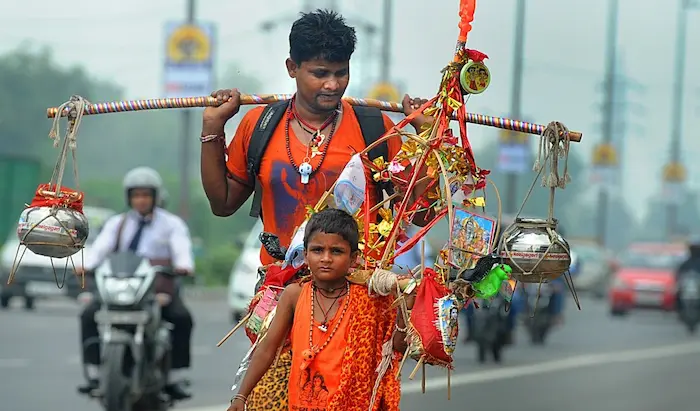
4. Yogi’s Reform Triumphs: Supreme Court Demands Visible Shop Permits on Pilgrimage Path
Supreme Court’s Decision: Legitimizing Faith-Friendly Governance
SC Upholds Tough Call of Yogi – On 22nd July 2025, the Supreme Court delivered its verdict on a contentious set of directives issued by the Yogi Adityanath-led government in Uttar Pradesh. At the heart of the matter was the administration’s insistence that all food vendors and commercial establishments lining the Kanwar Yatra route visibly display their:
- Government-issued license
- Tax registration documentation
The apex court deemed this move to be in compliance with constitutional principles, highlighting its alignment with consumer rights, religious sensitivities, and public health protocols.
Interestingly, while the QR code display mandate, which would allow pilgrims to digitally verify vendor identities was held back due to privacy concerns, the court maintained that physical display of documentation serves the same core purpose without crossing constitutional lines.
Context: Why the Directive Became a Flashpoint
The Kanwar Yatra, observed annually in the Hindu month of Shravan, attracts millions of Shiva devotees often barefoot who walk long distances to fetch holy water from the Ganga. With the surge in footfall, temporary eateries and retail stalls pop up along the route, many of them operating outside traditional regulatory frameworks.
In 2024, the UP government sought to bring structure and oversight to this surge in commercial activity by issuing new mandates:
- Display QR codes with vendor identification
- Install visible signage listing registration details
Opposition groups and civil rights organizations protested, labelling it a potential tool for religious profiling, especially of minority-owned establishments.
Key Highlights of the Supreme Court Ruling
The court drew a clear distinction between lawful transparency and invasive scrutiny. Some standout points include:
- Mandatory display of license and registration is legal and serves legitimate public interest.
- QR codes, though not enforced this year, may be reevaluated with additional safeguards.
- The measure was not found to be discriminatory and falls within the ambit of state-level administrative governance.
The court also appreciated the government’s effort to maintain religious harmony, noting that many devotees prefer vegetarian-only establishments and signage helps them make informed choices.
Political Discourse: Praise, Criticism, and Speculation
This ruling has reignited debates across party lines:
In Favor:
- BJP leaders call it a pro-pilgrim measure and a win for administrative reform.
- Many citizens see it as a way to weed out unauthorized vendors and boost hygiene standards.
- Some religious organizations have voiced support, stating that vegetarian signage helps maintain sanctity.
Opposed:
- Congress and Samajwadi Party leaders caution against the policy’s potential misuse, particularly in targeting small or minority-owned businesses.
- Critics also question the timing, alleging it’s geared toward polarizing voter sentiment ahead of 2026 elections.
Impact on Shopkeepers and Local Economy
For roadside vendors, especially in semi-urban and rural patches of the Kanwar Yatra route, this directive creates a new layer of bureaucratic responsibility. Here’s what it implies:
| Category | Impact |
| Registered Shops | Gain legitimacy, possible access to government schemes |
| Unregistered Vendors | Pressure to formalize operations or risk closure |
| Consumer Experience | Improved trust and clearer product categorization |
| Compliance Costs | May rise due to documentation and signage requirements |
However, several business owners believe that this could be a catalyst for long-term growth, bringing roadside entrepreneurship into India’s mainstream economic fold.
Analysis: What It Means for Future Religious Events
This ruling may set a governance precedent for other high-footfall religious festivals like:
- Kumbh Mela
- Amarnath Yatra
- Pandharpur Wari in Maharashtra
Expectations are rising that similar transparency mandates may be rolled out for vendor registration, food labelling, and even emergency medical accessibility during mass gatherings.
FAQ
What exactly does the Supreme Court’s verdict mandate?
Shopkeepers and eateries along the Kanwar Yatra route must display their business license and tax registration visibly.
Is displaying a QR code still required?
Not for this year. The court has advised caution and may revisit the QR code policy with privacy safeguards.
Why is this seen as controversial?
Some groups argue it enables indirect profiling and imposes undue burdens on informal vendors.
Does it impact religious freedom?
The court maintained the directive does not interfere with religious freedoms but rather enhances safety and sanitation.
Could this apply elsewhere?
Yes. The success and public response may influence similar governance measures in future pilgrimages and festivals.
Stay updated with the latest news on Rapido Updates. Keep yourself updated with The World, India News, Entertainment, Market, Automobile, Gadgets, Sports, and many more